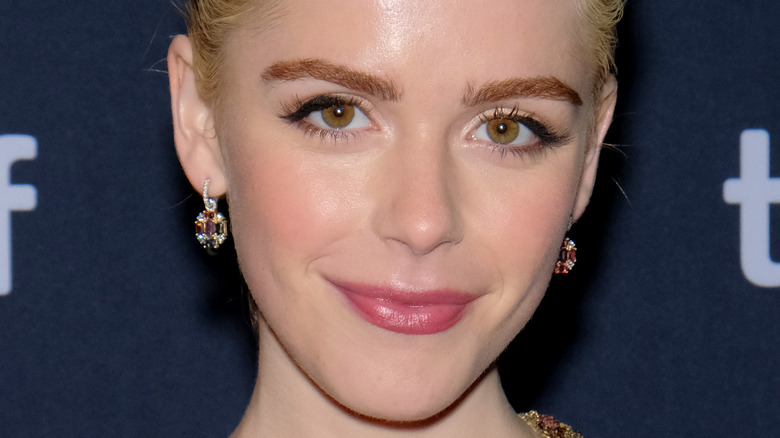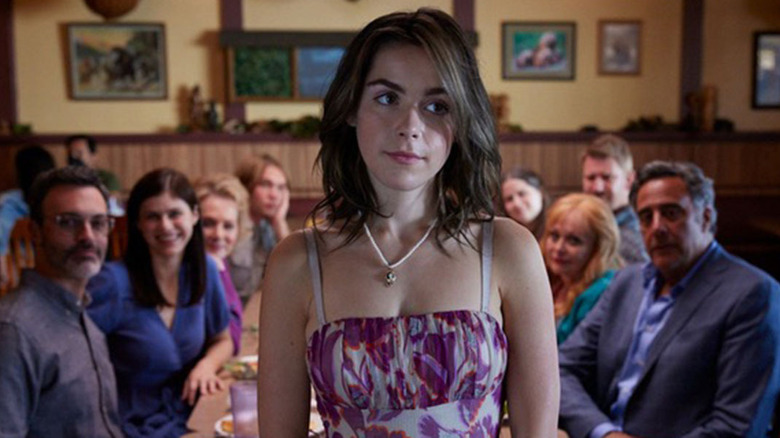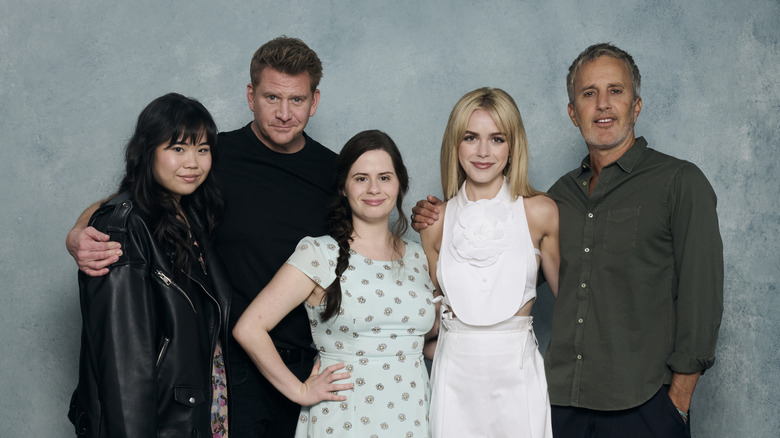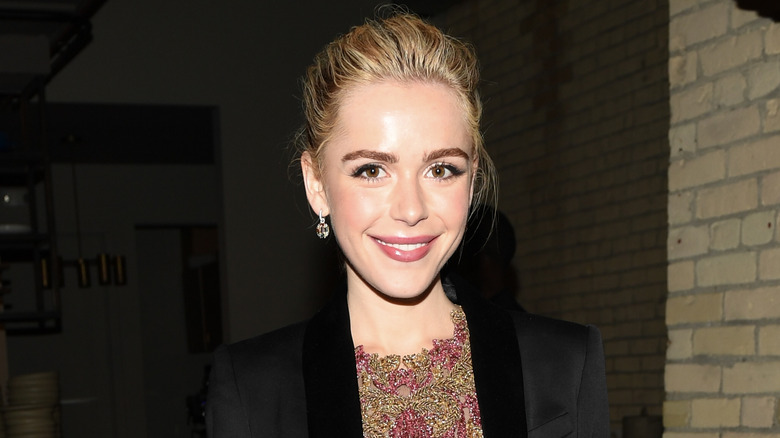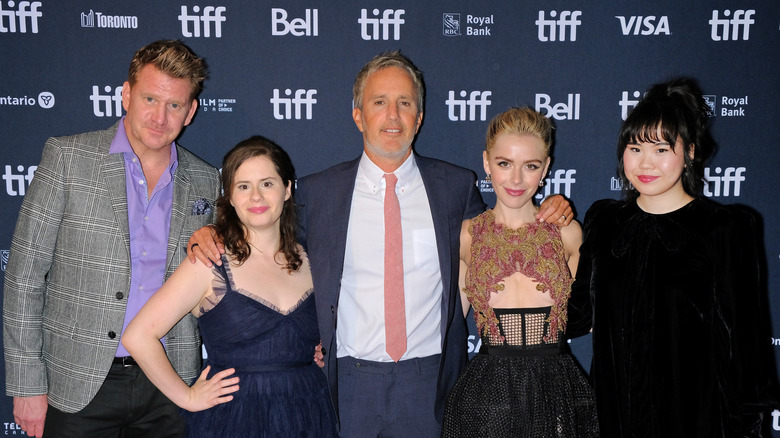Kiernan Shipka And Matt Smukler On Wildflower's Complicated Family - Exclusive Interview
It's hard enough being a teenager without having to navigate the pressures of being a caregiver for family members. In "Wildflower," Kiernan Shipka stars as Bea, a bright young woman who feels the weight of the world on her shoulders as she balances her school, a social life, and helping her intellectually disabled parents. We meet Bea as she lies unconscious in a hospital bed, reflecting on both the chaos around her and her life up until that point.
Director Matt Smukler adapts this story from the documentary by the same name that he also created back in 2020, and the production is given the star treatment with Jean Smart, Jacki Weaver, Charlie Plummer, Brad Garrett, and many others joining the ensemble cast.
Shipka brings an endearing sense of humor to the proceedings, creating a charming coming-of-age story that captures the difficulties of her complicated family life and the strong bonds of love that tie them all together. The young actress is best known for her work as Sally Draper on "Mad Men," as well as her starring role as Sabrina Spellman on "Chilling Adventures of Sabrina." During the Toronto International Film Festival, she and director Matt Smukler spoke to The List in an exclusive interview to discuss their experiences making "Wildflower."
Everybody clicked in a way that was magical.
You've been working with this story for quite some time now, obviously first as a documentary, and then now this film, so can you tell me a little bit about what drew you to this story and made you so passionate about wanting to tell it?
Matt Smukler: This was inspired by my niece actually, and I had been living with it for a long time. What started out as a little companion piece for her to get into college turned into a documentary, which then I realized needs to be a feature film and something that could be more accessible in many ways so more people could see it. We wrote a script and shared it with some incredible people and made it. [chuckle] It's that easy.
Did you find that there were any big challenges or anything that you noticed in translating it from documentary to a narrative film?
Smukler: We worked with a disability consultant. It was really important that all of us were well versed in terms of working with someone who had a disability. We worked with this woman, Elaine Hall, and we all got very comfortable. Everybody was on the same page and learned that Samantha [Hyde, who plays Bea's mother Sharon] wanted to be treated the same as everybody else. That was really important for the whole crew and everybody to hear. [Overall,] there wasn't any challenges.
Can you tell me a little bit about the process of putting together this really great ensemble cast, what you were specifically looking for in different people, but then also in having a cohesive whole?
Smukler: It was important to me because it's this multi-generational family that felt like the authenticity was there, and it was interesting for me because it was inspired by some real people. It was important that the chemistry all felt real. We met at my house and immediately I knew ... everybody's passion for the project and it was important to us that it felt real and everybody clicked in a way that was magical.
Creating the character of Bea
Kiernan, what was it that drew you to the character that made you really excited about being part of the project?
Kiernan Shipka: I read the script and I laughed and I cried and I was deeply moved by the script that Matt wrote. I remember getting on a call with you [Smukler]. We filmed this around this time last year, maybe October of 2021. I read it in the summer. I remember getting on a call with Matt and knowing that his vision and his passion for the story was something that I wanted to cling on to and be a part of.
Every single time that a new person was cast, I was like, "What? Another amazing actor?" It's a testament to the script and the story and how much art and soul there is in the whole thing. It was a really easy "yes" to doing this. There wasn't a lot of weighing the pros and cons, [and it] didn't really feel like there were any cons.
Did you have a lot of communication with your kind of real-life counterpart in building the character?
Shipka: Christina and I didn't chat too much. She is very much an inspiration for the character, and I drew a lot from her strength. We discussed making Bea a separate entity entirely and making sure that she was her own individual character and that I wasn't playing a real person necessarily, but more so inspired by it and inspired by her the whole time.
The longer I played Bea, the more I thought of Christina and the way that she has lived her life and moved about the world with such grace and such strength. That was an important anchor for my character. I zeroed in on specific qualities and the level of perseverance and the traits that she had more than modeling the character after someone who was specific, trying to talk like her [and] walk like her. It was [abot] taking the soul.
Smukler: That was a conscious decision that we both talked about. It was important to me that it was a launch off and that Kiernan could make it her own.
Bea's inner monologue
What was it like for you filming the hospital scenes? I feel like that must have been a very unique experience being part of these big chaotic family scenes, but not actually involved in them.
Shipka: It was fun. It was great. It's actually so lovely to sleep for 12 hours a day, and having Jean Smart and Jacki Weaver act over you is the wildest thing ever. I could joke about it because it was an easy three days of filming for me, but there is voice-over that is added to it later, so I did feel like being an observer, and also soaking in the family chaos that Bea has had to deal with and be a part of her whole life was very important for the character.
I did take a lot from that and then add it into the lived experiences that I made up for her in my head. It was extremely fun to watch and witness all these people running around, and waking up in that hospital bed was also one of my favorite scenes that we shot in the whole thing.
Talking about the voice-over, so much of the character building for the audience comes in that first act, and that's so much voice-over for you. Was that a challenge for you, primarily giving her so much of her personality through that rather than a physical performance?
Shipka: Definitely. It was an exciting challenge. We worked really hard on the voice-over and there were many shapes and forms that it took before the final one. It was important for me to make sure that the true distilled version of Bea was heard in those snippets. That's totally key to the movie. We wanted to make sure that it was right and perfect. [There was] a lot of, "Can I do it again?" [chuckle] To make sure that it really hit. I love that we meet her in that way. It's really original.
Smukler: I feel like we did a version of the voice-over even before we started shooting?
Shipka: Yeah, we did. I was in that booth a lot just to get temp stuff in there, and it was really helpful. Honestly, I had a ton of time to zero in and make it good. That's the thing with Matt: You make sure that there's a good quality in everything that you do, which is so key.
Smukler: That was super helpful for me, too, because it was like hearing it before we even started shooting Bea's inner thoughts and everything. The way Kiernan was honing in on it was actually very helpful in terms of filming, because I could hear her while she's in the coma after having recorded it. It was great.
This movie is really about love.
What message would you guys want the audience to take away from this film, the overarching thing that's like the most important to each of you?
Smukler: It's this multi-generational family that is full of life and there's dysfunction. The truth is, none of us are perfect. I do feel like we're a family and as long as there's love and as long as we try not to be critical of one another, it's quite beautiful. Ultimately, [my] takeaway is, if this movie puts a mirror up to your own life and your own family in a way, and suddenly you start to think, "What does it really mean to be normal?" then that's a great thing.
Shipka: This movie is about love and it's also about growing up and finding your own voice and appreciating different voices. The thing with Bea is that her journey in a lot of ways feels like, in the beginning of the movie, she has to do something and she's very sad and very stubborn in her ways, but she grows and expands throughout the movie and sees a life for herself beyond what she possibly could have imagined and dreamt up, stops holding herself back, and realizes that the other people around her aren't holding themselves back as much as maybe she is.
That's a really beautiful journey for her. It's about growing up, but also appreciating what you have and holding onto hope for the future and loving the life that you are in. That is the ultimate message.
"Wildflower" held its premiere at the Toronto International Film Festival. General release information has yet to be announced.
This interview has been edited for clarity.
